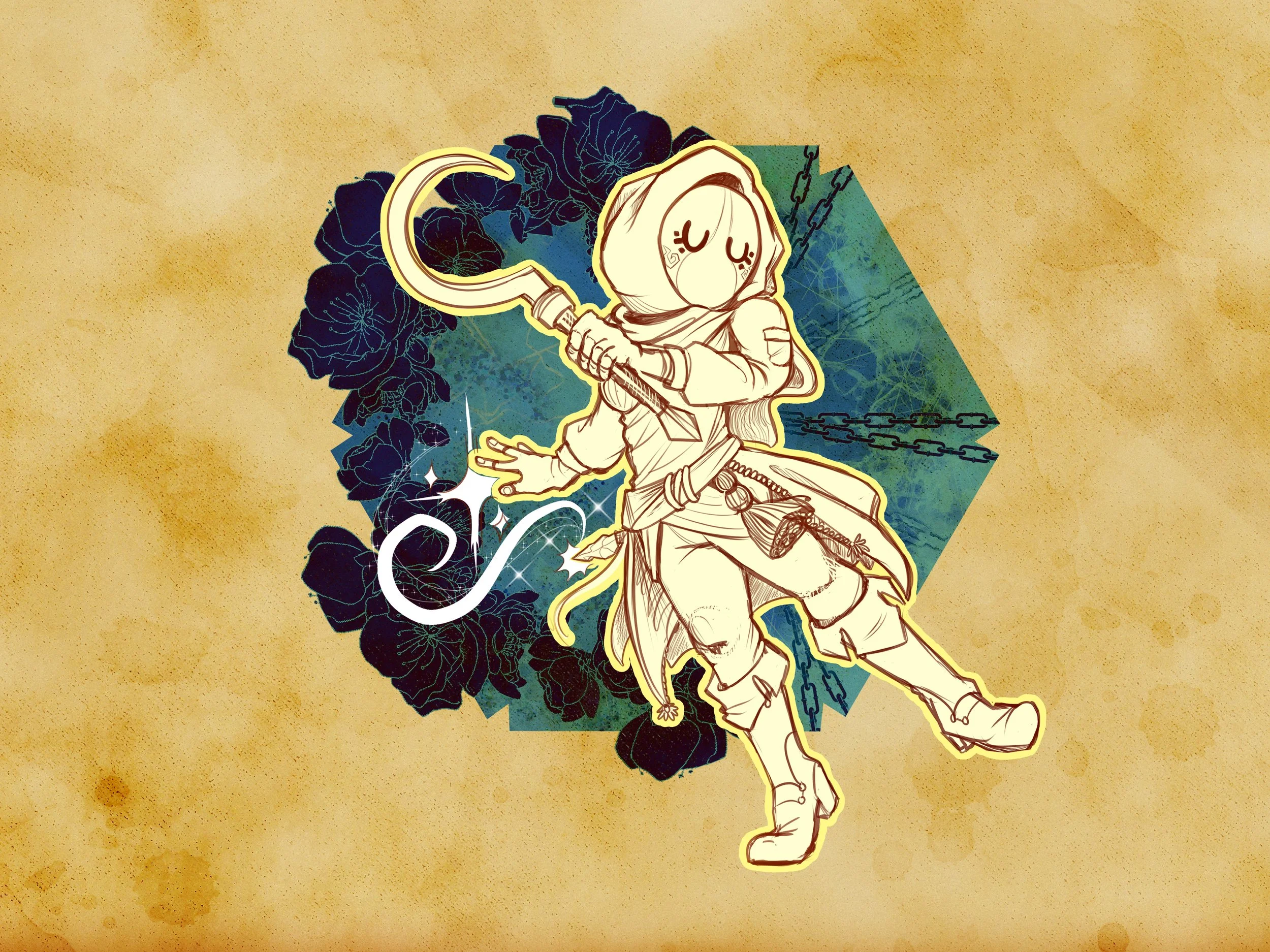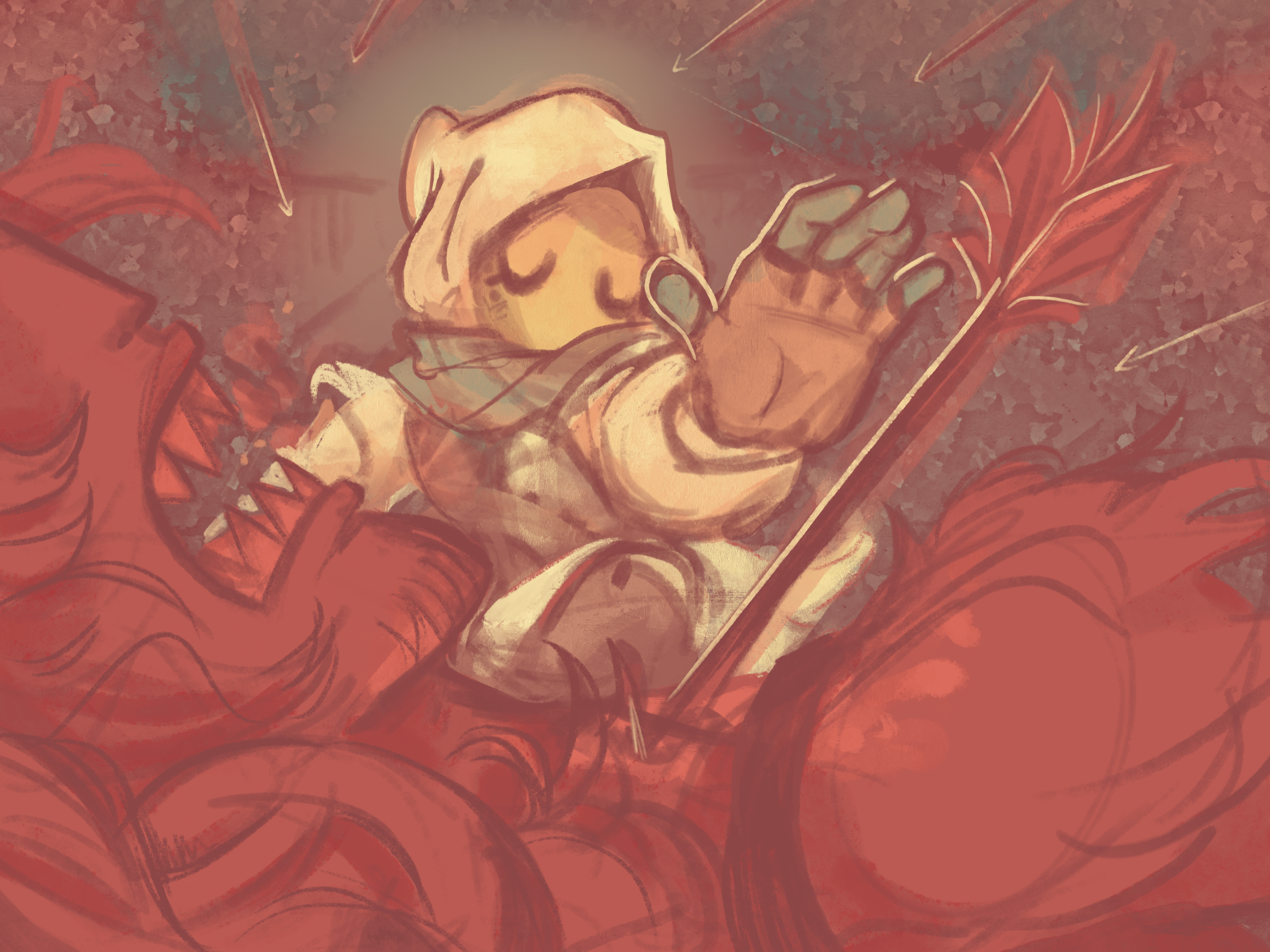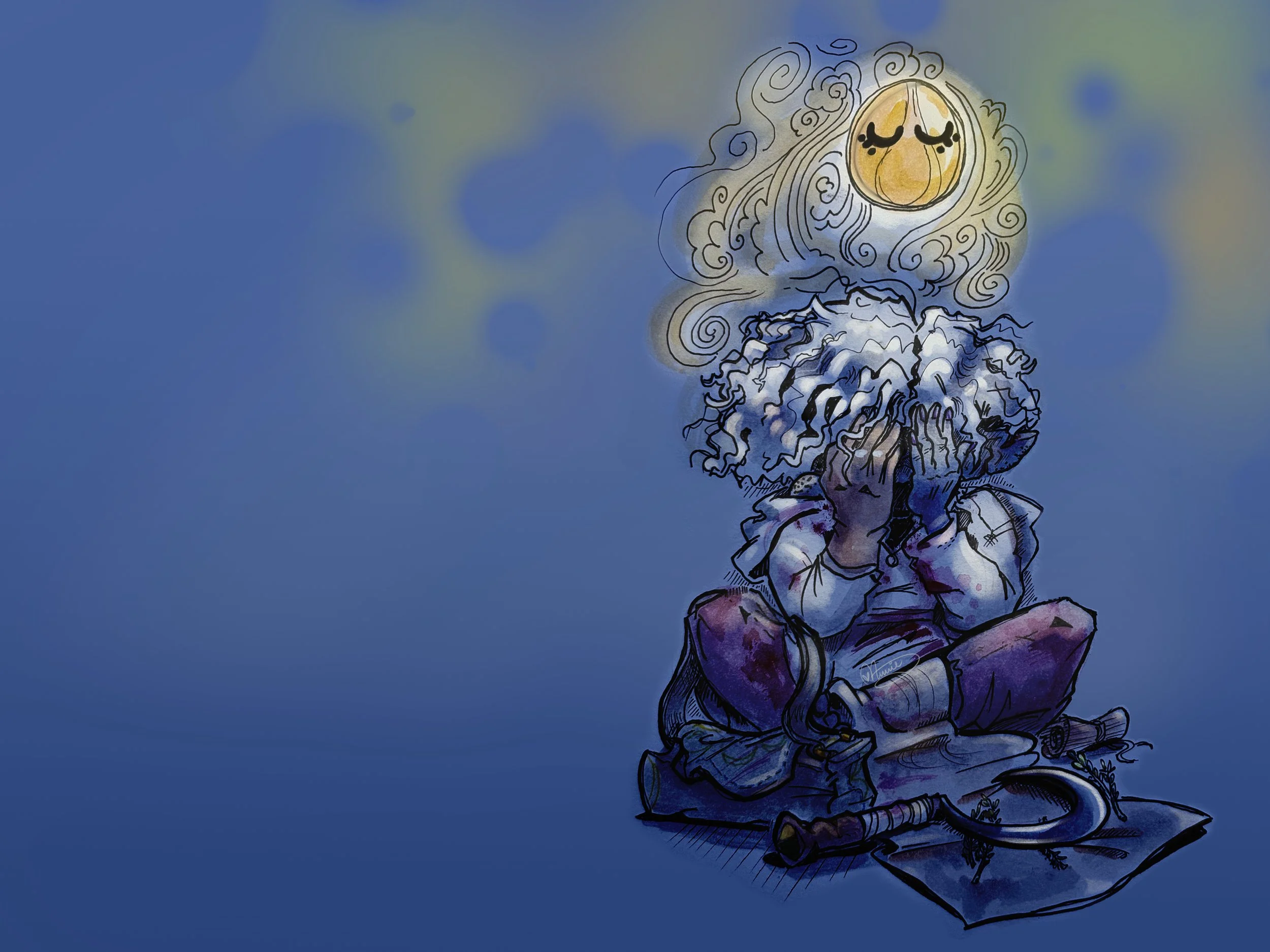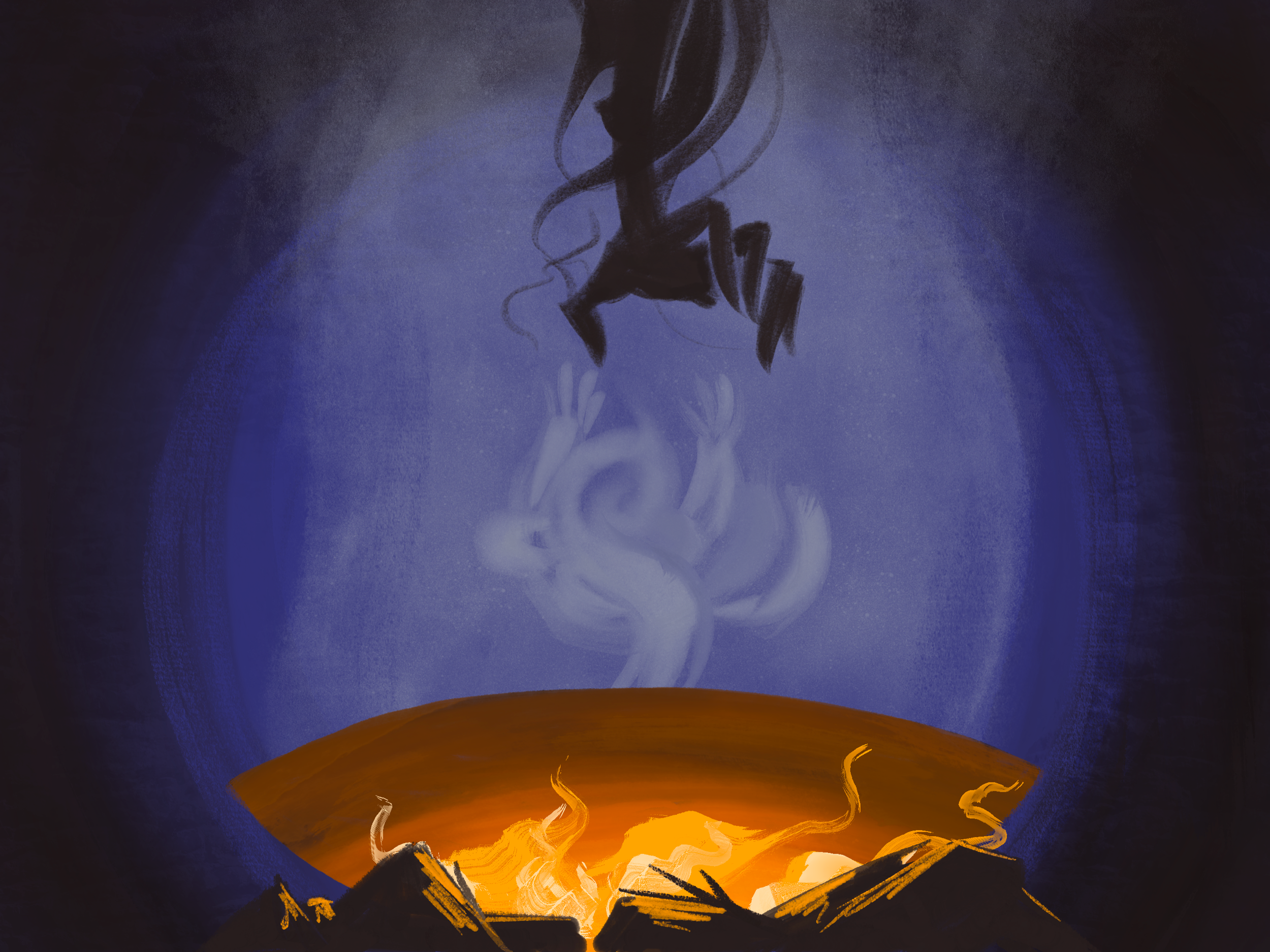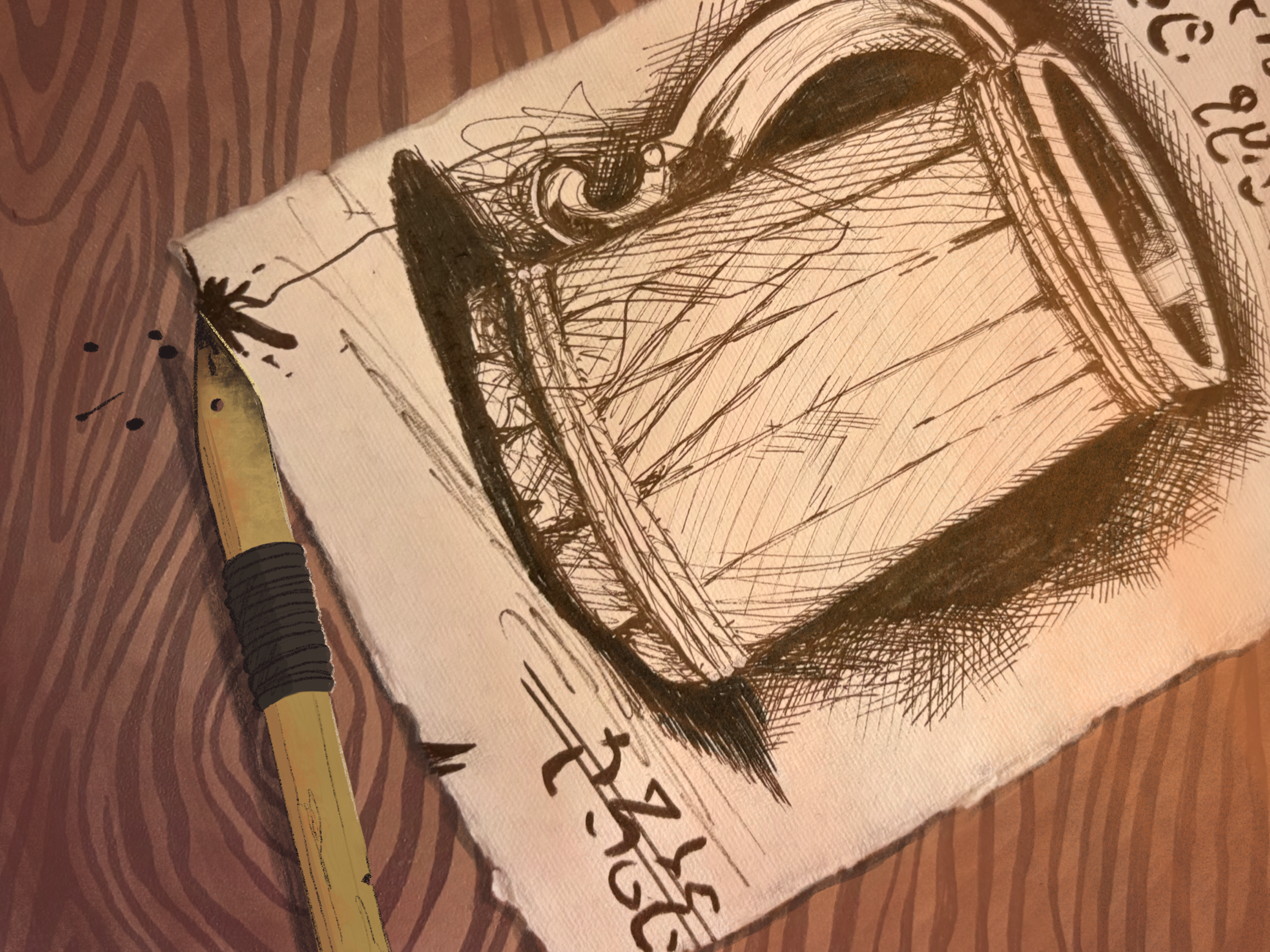Fanesca: Entry Twenty-Three
What is a Rilmani…?
Twenty-Third Entry
Though I had never seen one in the flesh until that day, I suppose I wouldn’t have been a passable (if thoroughly unwilling) student of the divine had I not at least been aware of the existence of beholderkin. Creatures spoken of as the antithesis of anything holy, born of hunger and scrutiny: nothing but eyes to judge and mouths to consume.
Yet the one that drifted forth from the shimmer above the green flame—four eyestalks, a stony emerald hide that seemed cut from the same glow as the jade fire itself—was not quite the nightmare I had been taught to fear. This was a purely lawful being. A Spectator. Naught but a guardian of this forge. Perhaps even an appointed one.
A long silence settled after the question it had hurled into our minds. “What is your purpose here?” I am unsure whether it was due to awe or simply the shock of having one’s thoughts rattled like a struck bell, but I could not answer. Not in that first moment. I nearly turned to the others for guidance, but its voice cleaved through our thoughts again, sharper this time:
“That is not my title, nor my god!”
Its ire seemed directed toward a flinching Ragar. I could only assume she had just attempted a reply—likely as flippant and unceremonious as her usual manner with every other notable figure we’ve crossed paths with.
But this was no ordinary encounter and spectators were well-known for their obsession with propriety, especially from those of us they considered lesser.
Maybe Raph’æl understood this better than the rest of us. I saw him step forward, his voice steady and true, even as his fingers laced and tightened behind his back.
“Great creature,” he said, “what is your title, so that we may address you proper?”
Every small stalk-eye flicked restlessly from one of us to the other, but the central, large one was fixed solely upon him. It gave no answer aloud. If it spoke, it was to Raph’æl’s mind alone. So my cleric friend continued in that careful, deliberate tone of diplomacy. It wasn’t fearless. Just masked.
“Great Spectator… it has been five hundred years. Whatever master you serve is no longer with us—”
“No! My master is not gone. My master shall return.”
“Then who is your master?” Ragar asked, now with a learned, uncharacteristic caution.
The creature’s stalks tightened inward, staring at one another as though consulting some inner chorus.
The silence stretched—long enough for my companions’ curiosity to overflow in a cascade of ill-advised questions.
“Did you forget?”
“Five centuries is a long time…”
“Did your master abandon you?”
“Did your master kill himself?”
“Shh, Super…!”
All of it washed over the Spectator unanswered. It remained suspended above the green flame, its contemplation so intense I could almost feel the heat of it. Then a flicker—something like a mental stammer—shivered through our thoughts before its voice returned, insistent rather than authoritative.
“There was a fight. I protected the forge. I destroyed the enemies. All that was left was the last two creations.”
Two of its stalks pointed toward a raised slab near the heart of the room. Upon it lay a shining mace and an ornate breastplate—the final works of the Forge of Spells. Although we exchanged looks, none of us dared to take a step. The creature might not have been evil, but that did not make it any less volatile in its dutiful state.
We were still strangers to the forge.
So we respectfully stood our ground.
Slowly, its coiled stalks unfurled. I recognized a strain of awed disquietude in its next question.
“Has it really been five hundred years…?”
It scanned our tallest members as they silently confirmed. A surge of frustration pressed against our thoughts—raw, directionless. But eventually it quieted, resolving into a weary, echoing certainty:
“All of you speak the truth. And I am tethered to this forge without my master’s word to say otherwise. I… serve no purpose tethered.”
Jack made the first courageous attempt at reason. He proposed that we could help untether the Spectator from its centuries-old vigil in exchange for our lives and safe, unhindered access to the Forge, for our allies’ sake as much as ours. The creature paused at this, drifting just slightly higher above the emerald flame. If it had eyelids, perhaps it would have narrowed them. Instead, it simply lingered. The length of its silence more pointed than words.
Then came Super, without hesitation and reverence alike. “Would you like me to be your master?”
The Spectator regarded him as if he had suggested the sky turn inside out.
“That depends,” it replied. “Are you a mighty wizard?”
Super shrugged. “No. But I did kill a dragon.”
“…ASTOUNDING.” The jolt that went through us all as it exclaimed was wholly apparent. The creature’s stalk-eyes flared outward like startled flowers, and suddenly I felt its presence dive into all our minds at once—sharp, swift, invasive. Searching.
I went rigid. I could feel its telepathic grip curling through my immediate memories like cold tendrils, rifling through them. Not deep, not yet—but enough that I saw the moments as clearly as it did: Venomfang’s roar, Jack’s rifle cracking the air, Raph’æl’s voice steadying us, Ragar and Super leaping from tree to scales. A mosaic of terror, triumph, and sheer luck.
Before I could summon any protest, the creature recoiled. It had found the truth it wanted. It withdrew.
Its central eye returned to Jack, mulling over the bargain with a sudden, mild curiosity. But three of its four stalks… they were no longer interested in him at all.
They were staring at me.
Unblinking. Trembling. Judging.
Why?
I stared back because I could not look away. I didn’t know what I had done to warrant such focus. The others continued speaking to its face, oblivious, while those stalks tugged subtly in my direction, as though urging their master to turn.
And then it did.
The maw. The great slit-pupil. All of it angled toward me with an awful, sickening sense of …recognition.
“YOU…”
The word cracked through my mind like thunder.
“What is a Rilmani doing here, of all places?”
My blood seemed to drain out through the soles of my boots.
“I don’t know what you’re talking about,” I managed, and I was proud—truly proud—that my voice did not quake the way the rest of me did.
The Spectator sounded genuinely perplexed, hovering closer. “Your mask. It is part of you. That is how your mind—”
It lurched backward mid-thought. All its eyes blinked furiously, as if stunned.
A mind as powerful as its own had hit… something. A wall? A door? A ward? I felt none of it, only the recoil.
“No, no… there is too much in there,” it muttered to itself before it laid all its wary sights upon me again. “Still. Why would a being of total neutrality walk this plane…?”
My lungs tightened until they felt like hollow shells. I could hear the others whispering—speculations, questions—but all of it slid past me, distant and useless. I had never heard that word in my life, and yet this creature said it as if it were my name.
“Please,” I said, quietly but firmly. “That’s enough.”
Whether out of awe for the Spectator’s insight or out of some impulsive desire to distract it from me, Ragar suddenly shot her long arm into the air.
“Me next! Do me next!” she insisted.
To my immense relief, the creature actually turned.
Everything after that blurred. Their discussion continued with its terms, quirks and bargains, but I heard none of it. My heart was a drumbeat. My thoughts were a snarl. I slipped away from the forge, each step making the air feel thicker, heavier, all types of wrong.
Sildar’s towering human form was stationed near the entrance. He saw me approach before I realized I had walked to him. “You alright, miss?”
“I just… need a moment,” I told him, and I sank onto a toppled pillar against a far wall.
I wanted desperately to take off my mask. To stare into its earnest, carved face and demand an answer to what had just happened. But as it usually tends to be, there were too many eyes, too many people, too many layers of fear between me and that kind of honesty. An honesty I couldn’t afford at the risk of The Messengers’ cruelty upon the people I cared for.
So I sat there instead, small and shaking behind this plate of brass, wondering how a single, foreign word—Rilmani—could hollow me out so completely without telling me anything at all.
“A being of total neutrality.”
“Not from this plane.”
What does that mean?
Is it really true that I’m still…
…even after running all this time…
…shackled to some otherworldly fate?
“Fanesca?”
Raph’æl call reached me from the forge entrance, and for one brief, disorienting moment, I forgot what had hollowed me out in the first place. Whatever tears had threatened to gather were forced back down. That voice of his—jubilant without being loud, gentle without pretense. I cannot fathom how it so often steadies me without the aid of magic.
He gestured to Gundren first, assuring him the Spectator was safe to speak to, and only then did he come to me. He approached carefully, as though afraid I might break if startled, before sitting beside me on the fallen pillar. He spoke. I listened. He explained what I had missed after leaving the heart of the forge. It was more than I realized I had lost. (I suppose I truly had been shutting things out; the cave’s thunderous waves had stopped registering after a while, despite echoing through the cavern with maddening regularity.)
Ragar had riled up the Spectator again (unintentionally, of course) but they had managed to salvage the situation through bargaining. Our lives would be spared. The Forge of Spells would be made available to us. In return, we were to deal with a sealed threat nearby. Raph’æl had stepped away to investigate it… until he noticed I was alone in the corner.
I stole a glance at him. There was performative optimism in the high elf’s voice, though his eyes shone with a question he was desperate to ask.
I hoped he wouldn’t.
But of course he did. Because he cares.
“Fanesca… what did the Spectator mean when it said the mask was a part of you?”
A painful pause.
“I really don’t know,” I said, barely above a breath. “I wish… I knew.”
Silence.
Perhaps he sensed my panic over the unknown swelling once again, just like it did at the tavern. Perhaps he sympathized with the nebulous aspects of my personal journey. Or perhaps this was simply how he moved through the world, with compassion offered freely and without ceremony.
Whatever the reason, I should have been prepared for it.
But still, I flinched when he draped an arm around my shoulders and drew me close.
No words accompanied this gesture. I don’t think he believed they were needed.
But there was something inside me that still craved a reason why.
Why like this?
Why for me?
No. This was fine. More than fine.
This… was merely the expression of his faith. The Ilmater that I never truly knew, but wished I did—the comfort offered without demand, the burden shared silently. If so, he was an extraordinary cleric indeed, to make me feel so complete while reflecting his deity’s embrace.
Surely that was all.
Surely it was not… what I wished it to be.
I am just a svirfneblin.
A people the drow—whom he vehemently despises— sees as slaves and sacrificial fodder.
I cannot be special. I cannot be chosen.
And I cannot be anything more than a friend.
And that’s… perfectly fine.
“You’ll figure this out, Fanesca, I’m sure,” he murmured, a smile touching his voice as he held me just a bit tighter.
I let myself rest against him. I knew what he meant. But I still allowed those words to drape over every sharp edge in my thoughts, like a protective veil.
I’ll figure this out.
I’ll figure us out, too.
“Alright, let’s go get that asshole!!”
Ragar’s vulgar word shattered the quiet. I could only assume right then that she was referring to whatever threat the Spectator had demanded we eliminate. She was already striding towards the unexplored reaches of the massive workshop when Grol Jr. and several of the bugbears stopped her to sort out what came next.
Raph’æl rose immediately, my tether to temporary bliss vanishing as quickly as it had settled.
But no resentment remained. Not right then.
He looked back to be sure I was coming with him.
To my left, the chartreuse glow of the forge spilled past the dividing archway, catching the fractured stone like liquid light. Jack, Super and Gundren were within it, clustered below the floating aberration that now granted them permission to at least ruminate over the treasured relics on display.
To my right, the cavernous workshop stretched into natural darkness—the faint outline of double doors half-swallowed by shadow, rendered visible only through the clarity of my heightened darkvision.
I already knew where he intended to go.
And I followed without hesitation.
The doors were a battered egress. They were barely holding together, hinges melted and edges fractured with thin, branching lines—as though they had resisted an implosion or held something back for centuries. Once another roaring pulse rolled through the cavern and faded, a new sound took its place. Behind the doors, a rasping masculine voice muttered incessantly, rising and falling like a fevered tide.
“Yesss. Yesss! And then if we do that—…no, no… why not. And then it happened. The death happened. Vengeance… vengeance… study. I must, I must… study. No. No…”
Whatever lingered behind that barrier did not sound coherent enough to escape. Either its wits had long since unraveled, or the doors were sealed by more than rust and manpower. The Spectator likely wanted this noise silenced, nothing more. I felt relatively unafraid. That was, until Raph’æl stepped closer and dared to peer through the keyhole.
A flash of hot light burst within. He jerked back.
I swallowed hard, breath stilled.
I wanted to ask if he was alright, but my mouth felt too dry to speak.
His brow furrowed as he looked at me and mouthed something I couldn’t quite catch.
Then a beat.
The voice continued its muttering:
“Pathetic spiders. They tried… sent them away…”
I stood as if the very absence of movement could somehow shield us.
Raph’æl raised his knuckles.
I shook my head. No.
He knocked anyway. Three quick, sharp taps.
I grabbed his arm and pulled him aside from the keyhole, hoping I had been quiet and quick enough to prevent whatever the hell lay within had not glimpsed him.
Stillness pressed in.
Then it knocked back.
Pause.
The voice resumed, fading deeper into the chamber as if pacing:
“…No no… trickery! No. Focus.
“Must learn… must learn… why… why… power. Power.”
Our stumble drew Ragar’s attention. She excused herself from the bugbears and called out for Jack to follow. She reached us first. Raph’æl briefed her quickly and then—unexpectedly—suggested she try reading the mysterious spirit’s mind.
For a moment, it caught me off guard. Only recently had we learned of her talent for reaching into thoughts and this was after she had invaded ours and nearly fractured our synergy beyond repair.
Yet Raph’æl asked her to utilize this very ability without a shred of bitterness. Something that, despite my confidence in her ability to befriend our new allies, would have still given me pause.
Wow. He’s so
…
Inside, the spirit rambled on:
“No power. No power yet… gotta touch… touch…”
Ragar’s face twisted with disgust. “I’ll try,” she whispered. She leaned to the keyhole, peering in with a sharp breath. I couldn’t take my eyes off of her as she worked, noting her hairs standing on end as a thin, yellow light from within reflected in her eyes. “How can I help you?” she asked, tone low and controlled.
A delighted moan answered.
“Ahh… OPEN THE DOOR.”
She yelped, stumbling back as threads of her very life-force were drawn from her face and throat toward the keyhole. In response to her cry, Jack rushed over and Raph’æl reached immediately for his brewed tonics.
It had attacked her.
“I can’t help you if you kill me,” she choked out, fighting to reclaim her breath.
“THEN OPEN THE DOOR,” the spirit hissed back, its excitement sickeningly palpable.
“As long as you promise not to harm us,” she managed.
Jack snarled and snatched her upper arm, saying nothing but his scarlet eyes shouted his thoughts loud and clear: “Don’t you DARE open that door.”
My attention splintered—between Ragar and Jack still grappling by the door, the barrier itself groaning under the pressure of something furious and half-forgotten, and Raph’æl, who stood poised for violence while his eyes betrayed how little he welcomed it.
He caught me watching him. Once more, he mouthed something to me—but this time I understood.
“FIREBALL.”
I hesitated. Ragar had one hand on the door again. Jack was hauling her back, the two of them locked in a strained, breathless argument. The hinges glowed with heat as the thing behind them strained and raved. Whatever magic sealed that threshold had been wrought with purpose—meant to end, or at least contain, some long-buried conflict the Spectator had spoken of.
I feared that a fireball would wield enough force from the Weave to break it.
But if it did… it would at least harm the creature that had tried to drain Ragar’s life from her body. My companion. My ally.
That was reason enough to trust this idea.
“Everyone, stand back,” I said.
The command came out steady. Measured.
And to my wonder—they listened.
Perhaps I have grown more than I allow myself to believe.
I drew the magic through the sulfur bead and crystal of my holstered wand, weaving it carefully, compressing the familiar heat into a speck of burning orange light small enough to slip through the keyhole. On the other side, the spirit laughed—high, rasping, delighted.
For a heartbeat, doubt flared.
Had I misjudged this? Had I given it exactly what it wanted?
I swallowed the fear. Every eye was on me now. Counting on me.
The bead whistled through the air as I flicked it forward. I spoke the final command.
The explosion was immediate and absolute. Fire filled the chamber beyond the door in a roaring bloom, the force tearing the barrier from its frame and blasting it outward. I was thrown back by the concussion but somehow stayed on my feet.
Only later did I realize something was missing.
I had felt no heat.
Coughing and blinking through the smoke and dust, we looked into the newly revealed chamber. At first, I thought the figure forming within was nothing more than the lingering ash of my spell. Then it moved.
The spirit of a wizard hovered there—hands skeletal, scalp stripped bare, its body shifting between smoke and something tangible, something hateful. It surged toward me with an excited grin, and in that instant I became painfully aware of how little planning I had done beyond act.
Someone shouted my name.
My dominant hand reached back, as if guided by the very force that forms that golden voice within, and laid grasp upon a seldom-used weapon: the emergency dagger Ragar had given me when we first met. Before our departure from Neverwinter. Before our fated wagon ride. All just in the case my sickle wouldn’t be enough.
I tore it from my belt and hurled it with a prayer rather than precision. It struck, faltered against the spirit’s ribcage, and clattered uselessly to the floor.
The creature laughed.
I ran past it—straight into the room it had been imprisoned in—snarling something wordless and loud to draw its attention. I have always been ignored in fights. Overlooked. A svirfneblin is easy to dismiss. Too small. Too inconsequential to bother with first.
So I chose not to be quiet.
I chose to be obvious.
It worked.
The spirit turned on me with a hiss, giving Jack his opening. He raised his rifle, shouted his warning to us, and fired—but the shot passed harmlessly through a wisp of its form. He cursed, swiftly discarded the black pepper staff, and drew Hew instead.
Everything fractured into motion.
Jack advanced with the copper-hued axe. Ragar darted forward, daggers fanned and ready. And Raph’æl—
For one terrible second, I lost sight of him.
My heart lurched.
Then I saw him. He had entered the chamber alongside me without my noticing, and as the undead wizard closed in, Raph’æl stepped between us. Shield raised. Spell already forming.
His back to me and his faith unflinching.
“Your time has come, specter,” he declared, Jack and Ragar poised to attack at both edges of my vision.
And in that moment, whatever else I feared… the names I did not understand, the truths I was not ready to face, the goodbyes I dreaded… dissipated once more. I was neither in the past nor the future.
The present was perilous. Frightening.
But they were all in it.
And I would fight for it to remain as such for as long as I could.

